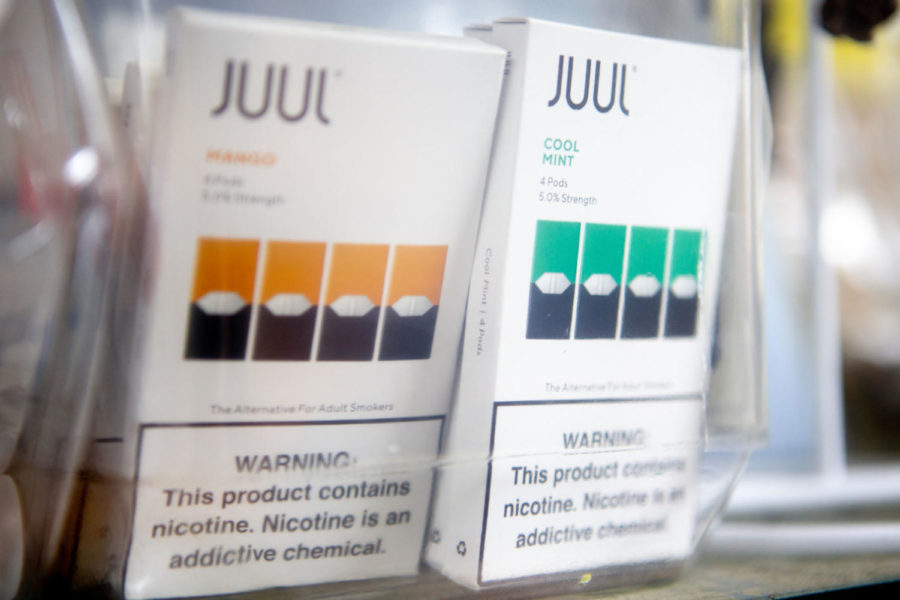Many Juul flavors will soon be leaving the shelves of local stores
Phillips Market, located near campus, is a vender of Juul Pods, the flavoring component in Juuls. On Friday, Nov. 16, 2018 in Lexington, Kentucky. Photo by Michael Clubb | Staff
November 15, 2018
It seems like everywhere you look there is someone on UK’s campus with a Juul.
Starting this week, the U.S. Food and Drug Administration announced it will be suspending sales of most fruit flavored cartridge-based e-cigarettes or Juul pods in convenience stores and gas stations across the US, as well as age-verification requirements for online sales to minors.
The New York Times reported that on Tuesday, Juul Labs, the company that makes and sells Juuls and holds a 70 percent share of the e-cigarette market share, preempted the FDA ban by suspending the sale of most of its products in retail stores and stopping all of its social media promotions. Mint, tobacco and menthol flavors will continue to be sold and other Juul products could still be purchased online.
The initiative is aimed at driving down the rate of vaping among minors, but will this stop older students from juuling?
“Flavored Juul pods add on to the popularity but the people who are actually addicted to nicotine will continue to use a Juul even if that means no flavored pods,” said junior Karl Gerlach. “However, they might reduce the amount they do and then eventually stop.”
E-cigarettes have grown in popularity since they were first introduced in 2003. According to a 2018 Gallup poll, 20 percent of 18-to-29-year-olds use e-cigarettes, compared with 8 percent among those 30 to 64 years of age.
Use among minors is reportedly high. According to a 2018 Center for Disease Control survey cited by the FDA, 3.6 million middle and high schoolers currently use e-cigarettes.
Over the past few years, the switch from cigarettes to Juuls has been prominent. The option of not only having mint but also flavors like mango and cucumber expands the curiosity of teens who may want to try it.
The FDA has often accused Juul Labs of targeting teens with their products and advertising. The flavored pods encourage people to start smoking at a younger age, the administration alleges.
According to the Gallup poll, young people are less likely than those 30 and older to believe vaping is risky. Only 22 percent of those under age 30 say vaping is “very harmful” to one’s health compared to 40 percent or more seen in every other age group.
Will Evans, a junior at the University of Kentucky, said he thinks Juuls are popular “because everyone believes that they are not as gross as cigs (cigarettes) and it is easier to do.”
According to Juul Labs, one Juul pod contains the nicotine equivalence of 20 cigarettes or essentially one pack of cigarette. Last year alone, the e-cigarette market grew by 40 percent and it’s evident that Juul has been a big portion of that growth.
Although there are many different views on this subject, Gerlach has his own opinion on why Juuling keeps growing in popularity.
“Some people might try it when other people around them are Juuling and end up liking it and purchase their own Juul,” Gerlach said.






























































































































































